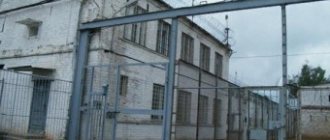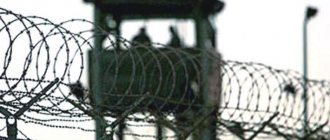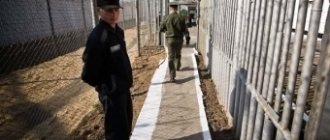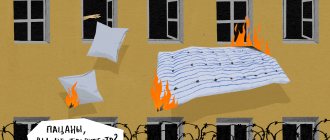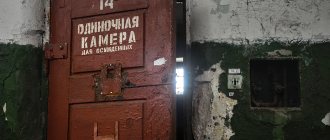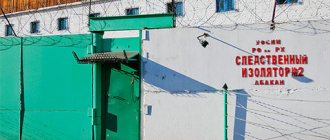| Carefully! This article may contain obscene language (obscene words and expressions). To hide inappropriate words when editing an article, you can use Template:Censorship |
Wikipedia as a prison
— the observation that Wikipedia is similar to places of deprivation of liberty, that is, a prison (in another version, a concentration camp). However, Wikipedia itself usually compares a ban (blocking) to a prison, rather than being on Wikipedia. The observation is based on materials from Russian Wikipedia.
[edit] Comparison
| Rule or custom of Russian Wikipedia | Prison rule or custom | Similarities and differences |
| Don't get caught up with newbies | Prison rules and regulations are first explained to the first mover, and minor violations are leniently treated if he did not know about them. | Wikipedia's rules prohibit the use of blocking on a participant if there is no reliable information that the participant is deliberately violating Wikipedia's rules (however, administrators do not always follow this rule). In prison, a person entering there for the first time is first explained the prison rules and regulations, and only those who deliberately violated them are “questioned” for violating them. However, sometimes (and in reality at least often) prisoners can deliberately use the prisoner’s ignorance of some prison customs in order to “put him down” for violating thieves’ concepts. |
| Ban on friendship with permanently blocked members | Prohibition on friendship with “lowered ones” | The attitude of Russian Wikipedia participants towards permanently blocked participants is based on the belief in a fair Wikipedia and therefore a respectable member of Russian Wikipedia should abhor permanent blockers and alternative wiki projects. It is permissible to communicate with lifelong servicemen only in a mentoring tone, as with lost sheep to guide them on the true path. In prison, the attitude of the “thieves” and “men” towards the “low-down” (offended) excludes the emergence of friendly relations between them. Unlike in prison, where a person who has been let down once can never subsequently become a “thieves” or a “muzhik,” in Russian Wikipedia, unblocking of a executed person is possible after his public repentance, in which he must express his commitment to faith in a fair Wikipedia. In practice, cases of pardon are quite rare - no more than one or two during one tenure of the Arbitration Committee. However, in the entire history of Russian Wikipedia, not a single permanent participant, unblocked by decision of the Arbitration Committee, was able to become an administrator (except for the global administrator Innv), and only two participants were able to receive the summing up flag - Postoronniy-13 and Vyacheslav84. In addition, most of those unblocked after some time still end up blocked indefinitely. Thus, the attitude of Russian Wikipedia participants towards those who are indefinitely blocked is largely similar to the attitude of the “thieves” and “men” towards the “omitted”. |
| Checking participants to bypass blocking | Finding out from the newcomer whether he is “omitted” | On Wikipedia, bypassing the block is punishable by permanent virtual blocking. In prison, a new arrival who admits that he is “low” is transferred to the appropriate place with the preservation of life and health. The “omitted” one who hides this fact risks being beaten or killed if the truth comes out. |
| Ethical behavior, Inadmissibility of insults, Flood of decent people | You have to be responsible for the market | In prison, great importance is attached to the rules of verbal communication, in relation to which there is a much larger number of taboos and conventions compared to the will. In particular, some zoometaphors (“goat”, “rooster”, etc.), which in ordinary usage, although they imply a negative assessment of the addressee, are not taboo, are practically excluded in prison speech communication. The same applies to some words of obscene vocabulary (“faggot”), including swear words (“e... your mother” is an extremely undesirable saying in these circles). You also need to be careful about how exactly to address your interlocutor (for example, addressing a criminal as “man” is to belittle his status, etc.). Since a variety of punishments are possible for violating the unwritten norms of prison speech etiquette, including “depression” or even murder, prisoners try to “filter the market.” On Wikipedia, violations of ethical behavior when communicating between participants, including insults of some participants by others, are also punished quite harshly with the help of progressive blocking. In addition, a Wikipedian who does not “follow the market” too much risks his future career, since aggressiveness in communication was often the reason for “rolling over” when nominated for one or another leadership status. On the other hand, the rules of EP and NO, like most rules, are applied selectively on Wikipedia: administrators and their favorites often get away with insulting other participants, while in relation to newcomers and somewhat objectionable participants these requirements are applied strictly and very harshly. As a result, in Wikipedia, just like in prison, you have to “keep an eye on the market,” and just like in prison, they can be “questioned” for a statement that some person with an admin flag didn’t like (“godfather”/“in law"). |
| Dividing participants by interest in owning flags | Division into “thieves” and “men” | In Russian Wikipedia, each participant determines for himself what he wants to do - whether writing articles and patrolling other people's edits, or summing up the leaving or deleting of articles, the work of an administrator, bureaucrat or arbitrator. The desire to become a summator, administrator, bureaucrat or arbitrator is assessed by the remaining participants during the voting process. In prison, each prisoner determines for himself whether he wants and can make a career in the criminal world (become a “thieve”) or simply serve his sentence and, after its completion, try to return to normal life (become a “man”). Everyone who wants to become a “thieves” is assessed by other “thieves” for compliance with their ideas about the applicant’s ability to comply with thieves’ concepts. Unlike a prison, where an applicant for “blatnoy” status is evaluated only by “thieves,” in Russian Wikipedia, each applicant for the flag of a summator, administrator, bureaucrat or arbitrator is evaluated not only by other bearers of these flags, but also by participants without these flags. At the same time, from time to time in the Russian Wikipedia there is criticism of this procedure, and various options are proposed, the essence of which boils down to reducing the influence of participants without the flags of the summator, administrator, bureaucrat or arbiter on the process of assigning these flags. However, these proposals are rejected, perhaps for the reason that all bearers of the flags of the summator, administrator, bureaucrat or arbitrator understand that they themselves can lose them for various reasons. On the other hand, according to the rules for assigning the admin flag, if the support level of a candidate is 2/3 plus or minus 3%, then the decision to assign the admin flag is made by bureaucrats based on an analysis of the arguments for and against. This rule was criticized from two sides - both towards the abolition of this corridor, for establishing a rigid limit on the level of support at 2/3, without leaving bureaucrats the right to choose in the matter of assigning the administrator flag, and for expanding the boundaries of this corridor, thus increasing the degree of influence bureaucrats on the process of assigning the administrator flag. However, none of these proposals received universal approval. |
In addition, both Wikipedia and prison have their own jargon. Also in Wikipedia, as well as in the zone, there is a “common fund” - funds of the Wikimedia Foundation, formed from voluntary donations from participants, the expenditure of which is controlled by “authoritative” Wikipedians, like the “common fund holders” in places of detention.
What are colonies like?
The main type of colony in the FSIN system is correctional. They were once called correctional labor, but time has made its own adjustments.
Correctional colonies differ in their detention regimes: they can be general, strict and special. The conditions of detention, the degree of supervision and “freedom” enjoyed by convicts are also different. In particular, the number of visits, transfers and permitted expenses for personal needs differs, as well as the degree of freedom of movement of a prisoner within the territory of a secure facility.
The vast majority of first-time convicts end up in regular zones, that is, in general regime colonies. You can get into a strict regime “from the start” only for a particularly serious crime: the main contingent are repeat offenders. Special conditions are prepared for especially dangerous repeat offenders, “wads” (that is, those sentenced to life imprisonment) and potential death row prisoners, for whom the exceptional measure has been replaced by imprisonment.
Women are kept separately from men. Recently, due to changes in the penal code of the Russian Federation, they are serving their sentences only in penal colonies and general regime penal colonies.
Within each regime, there is a gradation according to the conditions of detention: light, normal, strict. Under normal conditions of general and strict regime, convicts live mainly in dormitories, go to work and to the canteen, and in their free time can visit the library, club, gym and other cultural and sports areas of the zone. They move around the territory relatively freely; the dormitories are not locked.
On the territory of the colonies there are even more carefully guarded areas where the cells of the punishment cell (punishment cell) and the PKT are located. Placement in a PKT (cell-type room) is a significant restriction of freedom within the framework of SUS (strict conditions of detention). This is not a prison yet, but it’s close to it - prisoners live there under lock and key, but they are taken to work, albeit separately from the other “inmates.”
For good behavior, they can be rewarded with a transfer to easier conditions, to a “free zone,” that is, a colony-settlement. There, convicts are not even guarded, but rather their activities are supervised.
The “settlers” move both within the territory of the colony and beyond its borders almost freely (with the permission of their superiors), wear civilian clothes, use cash, and sometimes even live with their families. As an independent punishment, placement in a penal colony is applied to people who have committed minor crimes for the first time, mainly through negligence.
Educational colonies are, in principle, the same correctional colonies, but for minors, with compulsory education. Now there are very few of them in Russia, and the number of minors does not even reach a thousand - the state is humanizing and trying not to apply such harsh measures actually to children.
So, these were all colonies: correctional colonies of all regimes, settlements and educational ones.
Table of differences
In order for you to better understand the difference between a prison and a colony, we suggest you familiarize yourself with the table below:
| Jail | The colony | |
| Movements around the territory | Excluded. The criminal leaves the cell only for walks and meetings under the supervision of guards. | Since the institution resembles a village (there are even shops there), prisoners can visit places in accordance with the regime and its form. |
| Job | Hardly ever. | Work plays a major role in your stay here. |
| Correction | Unlikely. | It can leave an imprint on life, thereby removing the possibility of further bad deeds. |
| Varieties | There is none of them. | It can be strict, therapeutic, correctional, and educational, made specifically for children. |
Reference. Prisoners serving their sentences in a colony can earn money and spend it on food.
Read articles on the following topics:
- What is disbat?
- A guardhouse in the army: how does it differ from a disbat and what does a cell look like?
- What is the difference between a zone and a prison?
What is a prison and zone?
Firstly, in Russian colloquial language, the word “prison” refers to all places of deprivation of liberty. Secondly, camp and zone are synonyms. These two features create confusion for uninformed people, for whom both the prison and the colony appear in the imagination as damp and gloomy dungeons. But this, of course, is not true.
Pre-trial detention centers (SIZOs) are also called prisons, where suspects await the end of the investigation and the verdict of the court. There is more truth here. Although a pre-trial detention center cannot be a prison by definition, since people under investigation are imprisoned here, a pre-trial detention center and a prison are very similar in terms of conditions of detention. And these conditions, if not harsh, are very difficult.
A person in prison is deprived not only of freedom, but also freedom of movement. Most of the time (usually 23 hours) he sits in a cell. The walk lasts an hour, in a strictly designated and strictly guarded place, where even the sky is checkered.
What temporary temporary accommodation facilities are installed in the pre-trial detention center?
Find out what rights a person has when detained.
If you look at the zone in light of the above, it may seem like the opposite of a prison. But first you need to define the terms. The zone and camp are called correctional colonies (IK). The camp is a “legacy” of the Soviet Union.
In those days there were forced labor camps. The union no longer exists, as do the camps, but the term is used by inertia. In addition, it is not entirely convenient to use the official phrase “correctional colony” in colloquial speech - this is another reason why people use an outdated word.
The main difference between a zone and a prison is a softer regime of detention. There's a lot more freedom there. You can move around without an escort and your sentence is served not in cells, but in barracks (dormitories). You can go out of them and, for example, take a walk, albeit in a strictly defined sector. Moreover, you can work in the zone, there is a shop and even a club where cultural events are held.
To summarize, we can say that a colony is a prison settlement . Yes, they serve their sentences here, the prisoners are deservedly deprived of some rights, but at the same time they can lead a life, albeit remotely, but reminiscent of freedom.
But this does not mean that the colonies are good. In most cases, it is more humane than in prison, but the zones are different. Much depends on the population for which a particular correctional institution is intended. And not only from him. There are some other features that bring prisons closer to colonies and, on the contrary, make them different. Let's talk about them in more detail.
How are visits conducted in a pre-trial detention center?
What is the difference between a prison and a colony?
Let us outline the significant differences between a colony and a prison:
- In a colony, prisoners are put on the true path and educated; in prison, they are restricted from society and punished.
- In the zone, criminals are provided with employment and have the opportunity to receive monetary rewards for it.
- In correctional institutions, unlike prisons, prisoners have leisure time.
- In the colony you can not only work, but also master a technical specialty, that is, receive an appropriate education.
- We won’t delve into prison concepts, but we all understand, at least from afar, that prison conditions have their own hierarchy. In prison, such a social structure is normal and generally accepted; in the zone it is increasingly closer to civilian realities.
- Depending on the type of correctional colony, the prisoner may have the opportunity to travel outside the institution - for example, holidays and weekends with children and family.
- In a prison, convicts are kept in one building. There may be hulls or wings. The zone is a small civilization - a complex of sites and structures intended for use by prisoners (places of detention, work areas, places for walking, libraries and medical buildings, etc.)
